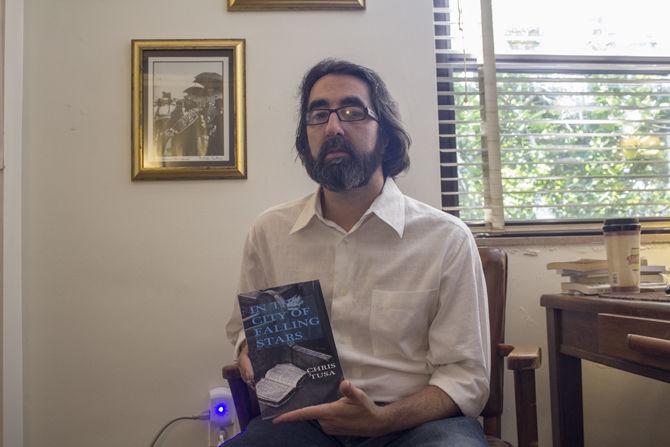Early Wednesday afternoon, Chris Tusa sat in his office proclaiming his love for his child.
Five years in the making, his “child” is a novel titled “In the City of Falling Stars,” scheduled for release tomorrow from the University of West Alabama Press.
Tusa, an English professor, has been a part of the University’s faculty since 2000. Throughout his career, he has had three books published, with two additional books still in the works. Another book of his is finished but has yet to be published.
“For a man, writing a book is the closest to [feeling] like you’ve had a child,” Tusa said. “It’s like you’re sending your kid out to go to college. You send it out there and people say bad things about it. You’re not there to protect it or speak up for it.”
The novel takes place in post-Katrina New Orleans during the beginning of the Iraq War, Tusa said. Fears of terrorism, Bird Flu, West Nile Virus and high levels of mold spores are running rampant.
“‘In the City of Falling Stars’ is a tragicomedy that examines the increasing paranoia following the Sept. 11 attacks, as well as a commentary on the devastating psychological scars that the storm left on the city of New Orleans,” Tusa said.
The main character, Maurice Delahoussaye, an African American, believes the government and its politicians are in cahoots with one another and are plotting against African American men in New Orleans.
Centered around an interracial relationship, the novel sets out to contemporize the South. Tusa said he believes perceptions of the South have not changed in literature. Southern residents are still characterized as people who go out hunting in their pick-up trucks and sit on their front porches drinking mint juleps, he said.
Tusa said he wanted Delahoussaye to be an African American because New Orleans’ African American community was most affected by the storm.
His inspiration for the novel came from a conversation he overheard, in which a woman discussed her fears and ensuing theory that in New Orleans, blacks were being targeted.
Predominately white areas did not experience much of the damage done to New Orleans, he said.
After the hurricane, the affected residents were ushered into trailers, which, six months later, they realized were poisonous. During this time, many blacks felt that the people who were supposed to help them were instead trying to kill them, he said.
Tusa plays upon their fears through Delahoussaye, who suffers from a bout of mental illness, which only adds to the paranoia he experiences throughout the novel.
“I’m really interested in mental illness,” Tusa said. “People can create this whole world in their head that doesn’t even exist and just live in it.”
Throughout the writing process, Tusa said he really got a feel for his characters. Once he knew who they were, he knew what they would and wouldn’t say.
His characters, through their personalities, began to do and say things that he never would have thought of on his own.
“It was fun to write about,” Tusa said. “You can turn all your fears into his fears too and create fears you didn’t even know you had.”
When watching movies, viewers just take what’s in front of them, but reading is interactive, Tusa said.
He makes his students write for their careers and industries, rather than stereotypical English Department-style essays.
“A lot of English teachers teach students to write well for the next class,” Tusa said. “But what you should be learning is how to prepare yourself for your life.”
English professor to release southern tragicomic novel
By Allie Cobb
September 28, 2016
Chris Tusa’s novel, ‘In the City of Falling Stars’ is set in New Orleans. The main character of the novel is an African-American male who is in an interracial relationship and believes the government is conspiracing against the African American’s within the city. Synposis given by Tusa in his office on Sept. 23, 2016 in his office in Allen Hall.
More to Discover





